#Financial District NY
Explore tagged Tumblr posts
Text

Lower Broadway, with the Woolworth Building in the distance, 1924.
Photo: Bettmann Archive/Getty Images/Fine Art America
136 notes
·
View notes
Photo

Old Drink
Have a pretzel after a long day doing capitalism
#black and white#manhattan#financial district#street photography#new york#street#nyc#new york city#new york stock exchange#ny#september#my work#photography
59 notes
·
View notes
Text










July 20, 2023 (2 of 2)
#photography#street photography#summer#square#square format#financial district#fidi#manhattan#new york#ny#sony#a7iv#zeiss#touit#32mm#50mm
3 notes
·
View notes
Text
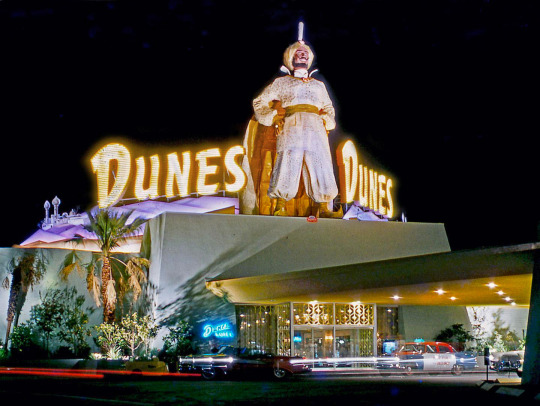
Dunes Hotel & Casino '55-'93
Dunes, 1955. Kodachrome photo from Charles Phoenix.
Timeline of the Dunes
’53-54: First announced as Hotel Araby (RJ 11/1/53), then became known as Vegas Plaza, and Hotel Deauville (RJ 1/20/54, 4/23/54). Named the Dunes by the time of groundbreaking, 6/22/54 (RJ).
’55: May 23, original owners Robert Rice, Al Gottesman, Joseph Sullivan, Alexander Barad and Jason Tarsey open the $4 million Dunes Hotel-Casino with 200 rooms on an 85-acre site. John Replogle, designer Robert Dorr Jr., architect and designer. Signs and Sultan figure by YESCO (RJ 5/23/55).
’55: Aug., Dunes leased by Sands partners and reopened in Sep. Subsequent financial difficulties cause the casino to be closed, 1/56.
’56: Bill Miller, Major A. Riddle, and Robert Rice are licensed to reopen the casino in May. In Nov., the license is changed to add M&R Investment Co. as the company that operates the Dunes.
’57: Jan., Minsky’s Follies opens the first topless show at a Strip resort.
’59: Convention Hall addition.
’61: Olympic Wing addition.
’62: Riddle sells 15 percent of the stock to M&R Investment Corp., whose stockholders now include Charles Rich, Sidney Wyman and George Duckworth.
’62: Oct. 21, Tower groundbreaking.
’64: Construction of "Miracle Mile" golf course. Sultan figure moved to golf course in May. In Oct-Nov, the 180-ft sign is installed in Oct., and switched on 11/12/64.
’65: Jun, opening of Dome of the Sea and the 24-story tower. Dunes Golf Course opened.
’69: Continental Connector Corp., a publicly traded company, buys the Dunes in a $59M stock transfer in May. In Dec, the SEC charges that CCC defrauded stockholders in the proxy statement it issued offering to buy the Dunes. CCC settles the SEC complaint in ’76. At this time, bankers E. Parry Thomas and Jerome Mack are principals in M&R and CCC.
’74: In Sep., Gaming Control Board files a complaint against the Dunes for catering and "comping" alleged Kansas City mob chief Nick Civella, one of 11 members of the Black Book, Nevada's List of Excluded Persons. The Dunes ultimately was fined $10,000.
’75: In Feb., Morris Shenker buys an interest in M&R through his IJK Nevada Inc. Later in the year, Dunes owners Shenker and Riddle are asked about allegations that reputed mobster Anthony Spilotro had "set up shop" at the Dunes. Spilotro reportedly was spending up to 14 hours a day in the poker room and appeared to be using it as an office.
’76: In Jun., Shenker sues the Teamsters Union for $140M for backing out of a loan commitment, which was to be used to add another 1,000 rooms. In Oct., Dept of Labor intervenes, saying the loan was prohibited. In ’80, Shenker's breach of contract lawsuit is tossed out of court by U.S. District Judge Roger Foley.
’79: South tower opened in summer. Shenker announces the Dunes will construct a $65M hotel-casino in Atlantic City. FBI affidavits are unsealed claiming that two confidential informants "both advised that the Kansas City organized crime group headed by Nick Civella has a concealed interest fronted by Shenker at the Dunes." Shenker denies the allegations.
’80: In Jan., alleged members of the NY Columbo family are discovered staying for free at the Dunes. Gaming Control Board Chairman Richard Bunker says the "comping" did not violate the law or gaming regulations. Later, four of the group, including Joseph Columbo Jr., are indicted on charges of obtaining money under false pretenses in an airline ticket reimbursement scam. The indictment is dismissed by District Judge Joseph Pavlikowski and in ’84 was reinstated by the NV Supreme Court.
’82: Aug., the $17M Oasis Casino opens, doubling the existing casino space at the resort. Design by Farris Alexander Congdon Architects. New 2-floor casino includes Xanadunes electronic gaming area, and Video-Video arcade space (RJ 8/13/82, 8/20/82).
’82: Dec., Stuart and Clifford Perlman agree to buy the Dunes for $185M. The brothers loan Shenker $4M and $2.9M of that sum is used to pay overdue federal payroll taxes and avoid the seizure of assets by the IRS. Shenker denies the resort is on the verge of bankruptcy. Docs filed with the SEC indicate the property is in default on a number of loans and a number of creditors threaten foreclosure action.
’83: The Perlmans assume management of the Dunes in Apr., and operate it for four months before the sale collapses in Aug.
’83: Oct., a foreclosure sale of the Dunes' golf course and some other property is averted when problems are worked out with the trustees of the Hotel & Restaurant Employees and Bartenders Int’l Union and the trustees of the Nevada Culinary and Bartenders Pension Trust, which are owed $1.5M for non-payment of union benefits.
’83: Dec., a federal jury in Las Vegas decides that Shenker owes $34M to the So. Nevada Culinary and Bartenders Pension Fund for defaulting on loans in ’73-’75 to two of Shenker's land companies, Sierra Charter Corp. and IJK Nevada.
’84: Feb., Shenker files for personal bankruptcy in Missouri to protect his assets from the $34M judgment. The IRS claims that the 78-year-old Shenker owes $66M in unpaid taxes stretching back 20 years. Shenker's bankruptcy filing claimed assets of $82M and liabilities of $197M, the largest debt ever recorded in the St. Louis bankruptcy court.
’84: Mar., Valley Bank of Nevada heads a consortium to lend the Dunes $68.6M as part of a debt restructuring plan.
’84: May, John Anderson buys a controlling interest in the Dunes with his JBA Investments Inc. Anderson signs a $25M note to pay the Perlmans for the $35M they invested in the resort. Shenker's 26 percent interest remains under the control of the bankruptcy court.
’84: Jun., the FBI alleges that Shenker approved $600,000 in kickbacks to alleged Milwaukee crime boss Frank Balistrieri in connection with loans from the Teamsters Union to Allen Glick, who later bought four Las Vegas resorts before being forced out of gaming by Nevada officials. Shenker denies the kickback allegations. No charges are filed.
’85: Feb., Dunes is cited for failing to retrofit the property to meet fire safety standards. About $2.2M is spent on retrofitting during the first half of the year.
’85: May, former Gaming Control Board Chairman Richard Bunker leaves his position as corporate treasurer of Circus Circus Ent. to become president of the Dunes.
’85: Aug., Jack Bona buys out the Dunes' 49 percent interest in its Atlantic City property in a $21M sale. The next day, Bona places the property in a Ch. 11 reorganization in bankruptcy court.
’85: Sept. 27, Dunes defaults on the $68.6M bank loan and Valley Bank moves ahead with the legal steps required for a foreclosure sale Dec. 23.
’85: Oct. 24, Federal marshals begin seizing cash from the Dunes casino cage to pay a $2.7M judgment obtained by trustees of the Culinary and Bartenders unions. They accept a $200,000 check and leave the cash in the cage.
’85: Nov. 1, Marshals return to collect the remaining $17M owed to the unions but are halted by a last-minute restraining order.
’85: Nov. 6, Dunes' operating company. M&R Investment, files for reorganization under Chapter 11.
’87: Masao Nangaku buys the Dunes for $157M.
’92: Nov., Dunes bought by Mirage Inc. for $75M.
’93: Jan. 26, closed. North tower and sign demolished 10/27/93.
‘94: Jul. 20, South tower demolished.
A major source for the timeline is Jane Ann Morrison. Judge Approves Payday for Dunes Employees. Review-Journal, 11/7/85.
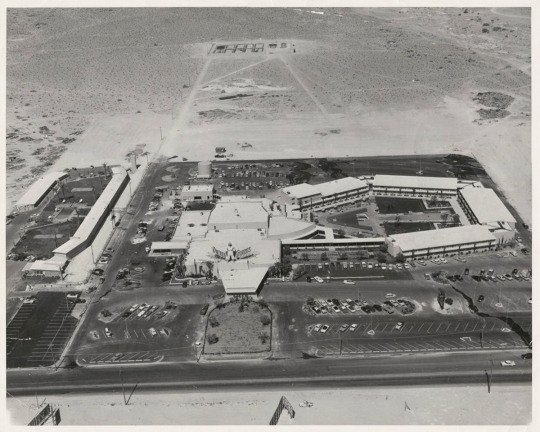
Dunes, 1955. This is the original layout of the resort, before the addition of the Convention Hall and Olympic wing. Photo by Ed Screeton. Dunes Hotel Photograph Collection (PH-00281), UNLV Special Collections & Archives.
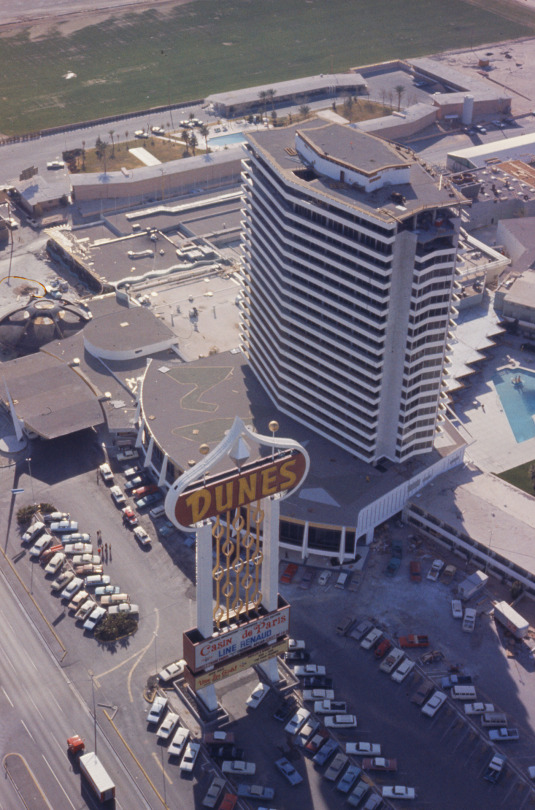
Late '64. The 180-foot sign has recently been completed. Dome of the Sea restaurant and the hotel tower are nearing completion. Culinary Workers Union Local 226 Photographs, UNLV Special Collections & Archives.

Mar. '85. Photo by Scott Henry, Review-Journal.
141 notes
·
View notes
Text
I don't care if nobody asked, Imma ramble about Angus Ciprianni anyways (/hj)
(Ik most of my content is Mario, but I NEED YALL TO UNDERSTAND THAT THAT'S NOT MY NEIGHBOR HAS TAKEN OVER MY BNNUY BRAIN AAA)

We don't canonically see the bottom half of the neighbors at all, so by decree of the bunny, Angus uses crutches.
Rarely refers to himself by his first name. Whenever he mentions his name, it's always "Ciprianni". However, calls everyone else by their first name so long as he knows it.
Because of the lack of medical advancement at the time, he has undiagnosed ADHD. Everyone just thinks it's part of who he is and nobody really knows ADHD exists.
Doesn't really fear doppelgangers unless they're outwardly hostile.
Annoys the living FUCK out of Francis and Steven. Will literally wait at the stairs to chat their ear off. He KNOWS it pisses them off. He does it anyways.
He doesn't really understand the consequences of actions. He can understand reasoning (ex If I push this person, they'll be upset), but not the aftermath of it. (ex Because they're upset at me, they don't want to speak to me.) This costs him lots of friendships.
Doesn't have a strong connection with his family. Only really talks to his brother once in a blue moon over the phone.
Sells drugs and makes a fortune off of it. Everyone thinks he takes said drugs because he's so hyperactive, but he doesn't.
Saw someone else headcanon that he's horrible with financial literacy, so guess what?
He hallucinates his nightmare variation (Abducius Morail) pretty often and sees him in his sleep.
Speaking of sleep, he sleeptalks.
Best friends with Elenois and Selenne. They would beat the crap out of anyone that tried to hurt Angus.
Compared to the other young men in his building (Steven, Izaack, Francis, and I suppose Afton), he is super SHORT. Even upright if he didn't use crutches, he would only come to Francis' chin and everyone else's shoulders.
Bisexual but leans heavily towards men.
Due to it being the fifties and all, barely anyone calls him by she/her pronouns, but he doesn't have a preference of pronouns and doesn't strongly associate himself with any specific gender.
Because of his crutches, everyone assumes he's in his thirties or forties, but he's actually younger than Steven.
Moved to this district from Queens NY. He will tell anyone and everyone about Queens regarless of if they asked.
Hates the heat and therefore hates using a stove, will eat dinner at other houses or at a diner at any given chance.
Slight hoarder. His apartment has a lot of junk in it, but he has trouble getting rid of any of it. He know's it's junk, but he feels sentimental value in the junk.
Pretty dramatic. Will dramaticise his unwillingness to do something if anyone tries to make him do something he hates. (Cleaning, cooking, etc)
And uh, yeah, that's all the Angus I have for now <3
55 notes
·
View notes
Text
This news is taking a toll on honest New Yorkers.
Outrage mounted in the Big Apple Monday after the revelation the MTA lost $5.1 billion in unpaid tolls and fees over four years – while drivers doing the right thing are forced to pay more.
The massive unpaid collections at the Metropolitan Transportation Authority’s nine bridges and tunnels surpasses the estimated $500 million to $800 million expected to be generated annually from the new $9 first-in-the-nation congestion toll to enter Midtown Manhattan south of 60th Street.
“They can’t even collect their unpaid tolls,” fumed Harry Nespoli, chairman of the 300,000-member NYC Municipal Labor Council and head of the sanitation workers’ union. “So, they’re going to make it up by socking us with congestion pricing.
“They should collect from the toll violators,” added Nespoli, who has appealed to President Trump to kill congestion pricing. “Right now, the law-abiding working people are paying for them [the deadbeats].”
MTA figures showed deadbeats racked up $5.1 billion in unpaid MTA tolls and violations such as late fees over four years from 2021 to 2024 — a number likely sent skyrocketing since “cashless” systems replaced the old payment booths, though officials sought to downplay the figures saying it’s not just “toll debt” in the wake of a Post report Sunday.
The authority estimated total uncollected “toll violations” at more than $1.4 billion in 2024 alone and $3.7 billion combined from 2021 through 2023, according to a financial chart included in a request for proposals submitted to potential debt collectors.
The proposal said the annual figure for unpaid toll collections could exceed $2 billion when factoring in the $9 congestion toll — a fee that will rise to $12 in 2028 and $15 in 2031.
Benjamin Li, 40, from Bensonhurst, Brooklyn, who tows a smoothie cart by Zuccotti Park in the Financial District, said authorities should levy the toll evaders instead of socking him and other hard-working New Yorkers with a new congestion toll.
He now arrives into Manhattan at 4:45 a.m. with his cart to pay a lower $2.25 overnight fee and save $6.75 off the $9 toll charged during the peak hours.
“I obey the law, whatever they charge. But I see so many people trying to save money illegally with ghost plates,” Li said.
Deadbeat drivers racked up $5B in unpaid MTA tolls in 4 years — and closing booths to go ‘cashless’ may be to blame
Long Island truck driver Kenny McCutcheon, 32, was worked up over the news as he was running errands in Manhattan on Monday.
“They need to crack down more on people who don’t pay the tolls, instead of charging the rest of us so much,” said McCutcheon. “I think it’s ridiculous I gotta pay $9 just to come here.”
MTA toll crossings include the Hugh Carey/Brooklyn Battery Tunnel, Queens Midtown Tunnel, Whitestone Bridge, Throgs Neck Bridge, Verrazano-Narrows Bridge, Cross Bay Bridge, Marine Parkway Bridge, Henry Budget Bridge and Robert Kennedy-Triboro Bridge. At six of the major crossings, the toll is $11.19 without E-ZPass and $6.94 with it.
A federal bankruptcy judge told The Post Monday he’s seen cases where debtors reported owing thousands of dollars in unpaid tolls, and questioned whether collections is a priority for the MTA and New York’s political class..
“They’re not skipping one or two tolls. They are abusing the system,” said Kenneth Kirschenbaum, a US Bankruptcy Trustee who hears Chapter 7 Bankruptcy cases in Central Islip, Eastern District.
“That’s not inadvertent. That’s not unintentional. That person doesn’t deserve any pity.”
In one bankruptcy case, one debtor sought forgiveness for owing E-Z Pass New York $9,900, he said. E-ZPass NY covers the MTA crossings as well as tolls on the state Thruway.
Nassau County Executive Bruce Blakeman said the listing of billions in unpaid MTA tolls and violations by scofflaws is another just example of a culture of lawlessness in the Empire State.
“This is what happens when you have a state that doesn’t enforce its laws and people feel they can get away with anything due to the incompetence of leadership in Albany and at the MTA,” Blakeman said.
“Taxpayers are left with the burden of having to close the huge deficits with idiotic programs like congestion pricing which based on the MTA’s track record, most people won’t pay either.”
But the MTA downplayed the figures it presented to debt collectors as part of a bidding process, and said the $5 billion in unpaid toll and fee collections was blown out of proportion.
MTA Bridges and Tunnels president Catherine Sheridan called The Post’s reporting of its own numbers “misleading” and claimed it “grossly overstates our toll losses” — but did not dispute the figures.
“There’s just a lack of understanding that the amount we place with a collections agency is not outstanding debt, it’s not tolls,” Sheridan said at an MTA committee meeting Monday.
“It includes tolls and fees and any other penalties that may apply so the number may appear very large but that is not toll debt,” Sheridan said.
But Sheridan admitted that the use of ghost plates to avoid collection is a challenge.
“Ninety two percent of the people pay, whether that’s by E-ZPass or tolls by mail upfront,” she said. “There’s about 8% who are either unbillable, where we don’t know who they are because they have a ghost plate, or they just don’t pay even after we’ve sent them multiple bills.”
MTA officials on Monday also said it collected $113 million of the $241 million in outstanding tolls in 2023 — or less than half.
Officials also said the agency put in 500 requests for the Department of Motor Vehicles to revoke car registration of toll deadbeats, which is allowed under the law.
Transit officials also said they have new authority to impose judgments on toll scofflaws without going to court.
8 notes
·
View notes
Text




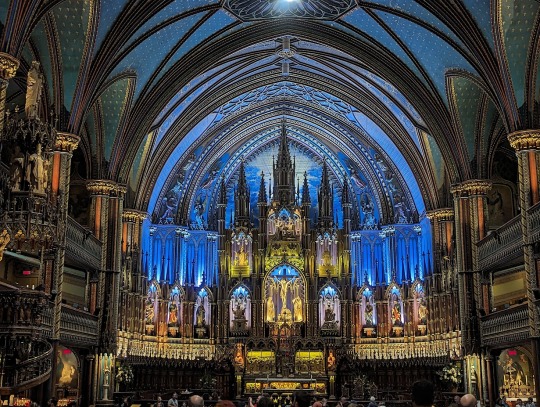
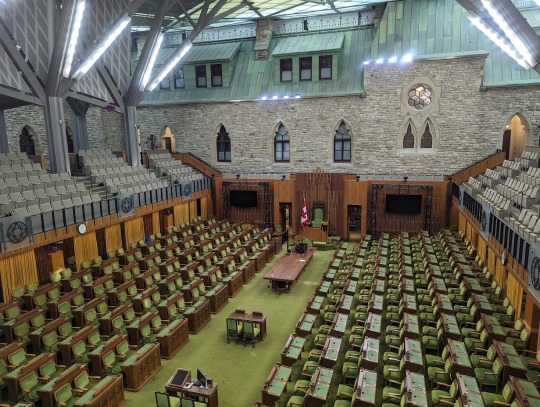
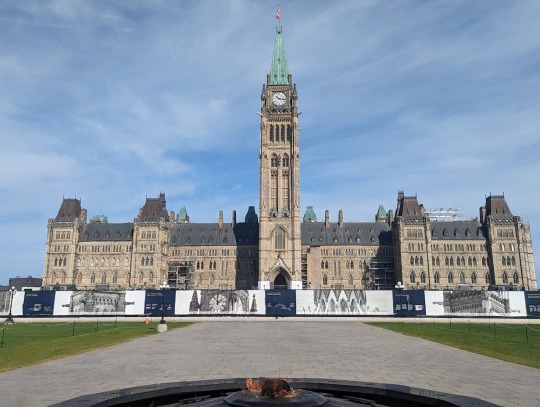

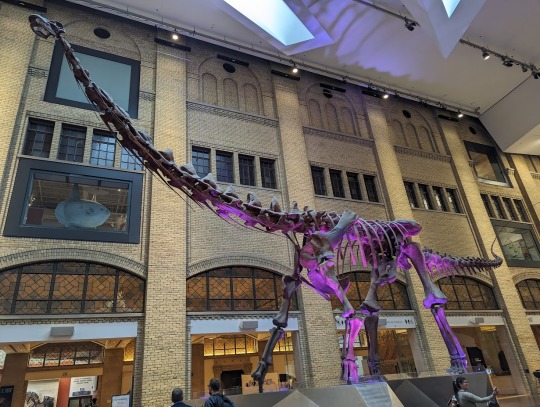
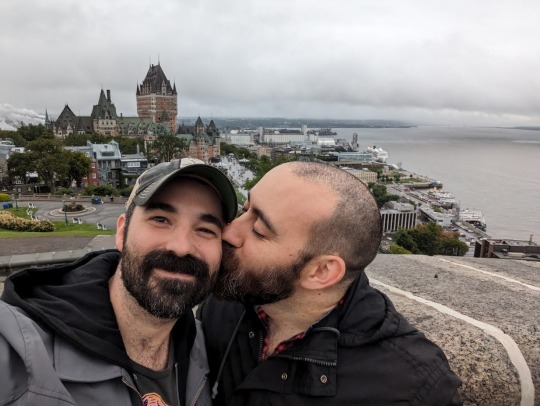
Lifting my self-imposed embargo because I'm weird and don't like posting on social media when I'm on vacation.
I'm at a point in my life where I can financially justify at least one international vacation a year and figured I'd finally cross off the Great White North from the bucket list. I'd never been and Andrew hadn't been back in a very long time despite having dual citizenship. Anyways, just got back, and a bullet-point breakdown of the highlights is after the cut:
I wish every international flight was under two hours; EWR to YQB was almost comically fast.
Had my first French conversation with the very nice lady at the car rental counter for about ten minutes. She complemented my pronunciation and grammar, and wished me luck on the trip. Every French interaction after this point was a linguistic battle for my life that I lost (Toutes les Québecois parlent trop vite pour moi).
We had some time to kill before the hotel check-in so we went to a mall in the suburbs just so we'd have a food court with some options. Turns out shopping malls are not only alive and well but fucking thriving in Canada. I haven't seen a mall that packed with people outside of December since the nineties.
Quebec City was very dense with old architecture which made it feel very European. It was also apparently built on a fucking cliff with streets at 60 degree inclines, which also felt very European.
Took a tour of the Quebec Parliament building (beautiful structure), and apparently they used to be bicameral, but voted to abolish their Senate in the 60's and they were the last Canadian province to do so. What a concept.
It's one thing to know on paper that Canada has about 1/8th of the population of the US, but I was not prepared for just how empty the countryside felt. For someone like me, living in the northeast my whole life, the idea that cities in close proximity to each other not having continuous stretches of suburbs and other smaller cities connecting them was completely foreign.
On the highways I kept thinking I was speeding because I'd look down at the dashboard and see the number "100", but 100 km/h is only like 62 mph, which is nothing.
Similarly, I kept getting sticker shock every time I spent money, and kept having to remind myself that $1 CAD was like $0.73 USD while we were there.
It was really cool to see that the complex for the 1976 Montreal Olympics is still maintained and actively used (we stumbled upon a skateboarding competition and I did not feel cool enough to be in that crowd). Sometimes you hear horror stories about Olympic villages bankrupting cities and falling into disuse afterwards, but that's definitely not the case here.
Montreal is apparently known for their local bagel culture, but their bagels have enormous holes in the middle of them, so you have less cross-sectional area for spreads and they don't really work for sandwiches. My faith in NJ/NY bagel superiority remains intact.
Every city we went to had dedicated bike lane infrastructure and young families with kids, but Montreal definitely had the most of both. Tons of parks, too. Simultaneously felt like a larger and smaller city than I was expecting.
Poutine is okay, but I wasn't prepared for the cheese to squeak when you bite into it. Very odd sensation.
The main Parliament building for the federal government in Ottawa (Centre Block) is stunning, but closed; apparently it's been under renovation since 2019 and isn't expected to be reopened until 2032! In the meantime, we took a tour of where the lower House of Commons is currently meeting. We learned that their electoral districts are routinely re-drafted by a non-partisan committee and that they occasionally add new seats to the legislature to account for changes in population. I had to seethe jealously in silence for the rest of the tour.
Also toured their Supreme Court building (way more Art Deco than I was expecting). We learned that there's currently a vacancy because a Justice recently retired because they're required to step down when they turn 75. I had to seethe jealously in silence for the rest of the tour.
Every single city had automatic/self-serve parking garages where you didn't have to interact with a human (which I was very thankful for), but in Ottawa they have this little jingle that the machine sings at you when you take your ticket, which I found very amusing.
On the drive to Toronto we took a quick detour into the Thousand Islands (yes, like the salad dressing) and visited Boldt Castle, which is technically in New York state. After seeing it in practice, the idea of living on your own private island is more appealing than ever.
Toronto feels like an exercise in what happens when a nation's largest city is allowed to grow without being hemmed in by ridiculous geography. As someone who grew up in NYC, this is another concept foreign to me. The GPS did get very tripped up navigating a particularly gnarly interchange however.
Toured the Ontario Legislative Assembly (yet another beautiful building). At this point we were really good at asking tour guides stuff like, "so if happens, do you guys have a plan?" To which they would reply, "well, no, but let's just hope that never happens!"
I now understand why the Great Lakes are effectively freshwater inland seas; you really cannot see the other shore, and Lake Ontario isn't even the biggest one!
YYC to EWR was under an hour. That's definitely going to spoil me for future trips going forward.
93 notes
·
View notes
Text
by Corey Walker
In the hours following Bowman’s loss, left-wing commentators immediately shifted blame toward AIPAC, the foremost pro-Israel lobbying organization in the US, attributing the election results solely to the group’s financial resources.
Olayemi Olurin, a leftist pundit and fierce critic of Israel, floated the idea that AIPAC engineered a smear campaign against Bowman by inundating voters with misleading campaign ads.
“It’s not a leftist conspiracy theory that AIPAC quite literally spent more money than ever before to unseat Jamaal Bowman for his stance on Israel,” Olurin posted on X/Twitter. “New Yorkers were drowned in ads smearing Bowman — that coupled with the redistricting of his district cost him the seat.”
Bowman appeared on Olurin’s YouTube channel earlier this month to discuss the state of the ongoing Israel-Hamas war. During the interview, the congressman compared Israel unfavorably to the United States, claiming that both countries were built upon a foundation of “white supremacy.” He also suggested that the Jewish state was responsible for the Hamas terrorist group’s Oct. 7 attacks, which resulted in the biggest single-day massacre of Jews since the Holocaust.
Cynthia Nixon, a former New York City mayoral candidate and progressive commentator, accused AIPAC of being operated by “far-right Republicans” and blamed the group for flooding the primary race with millions of dollars in an attempt to remove Bowman from office. Similarly, Bowman has denounced AIPAC as being an alleged tool of “racist” Republicans and allies of former US President Donald Trump.
“Bowman is the last Congress person of color in a NY district not wholly in NYC. And let’s be clear — the record $20 mill spent against him did not come from Dems in this Dem primary but from anti-abortion, anti-climate justice, anti-worker far-right Republicans. You do the math,” Nixon posted on X/Twitter.
Blaming the Jews is standard operating position. EY
20 notes
·
View notes
Text
Well, well, well...
Ever since barkjack tweeted about Andrew & the FBI, I did a search for all the news articles about the FBI allegedly "pausing" their investigation about Andrew.
Irish Star (on MSN)
GB News (on MSN)
The Express Tribune
Business Times
Metro (UK)
Sahara Reporters
Daily Mail (UK)
Somehow they are all quoting an EXCLUSIVE to The Mirror.
A source close to the case told the Mirror: “The agents and attorneys who have, for years, worked diligently looking into Andrew’s friendship with Epstein are beyond frustrated. “They’re angry that the probe has been parked. “But the truth be told, no new leads have been discovered for quite some time, and until new evidence is presented that can move the case forward, it has been shelved.” Last night, one of those abused by now dead Epstein when she was a teenager labelled the move, a “systematic cover-up”. The 36-year-old, awarded compensation from the Wall Street financier’s victim’s fund, said: “All of us who have continued to fight for justice knew this day would one day come. “From the very beginning, we have been denied our voices, brushed under the carpet and told to be quiet. The government always says that no one is above the law, but we all know that is untrue. For the past three decades, we have been party to a systematic cover-up, and this is now the final part of that.” [...] “We simply don’t have the resources to keep every case running at full capacity, and right now, it’s the Diddy case consuming the lion’s share of investigative efforts.” Despite the huge public interest in Andrew’s connection to Epstein, the Southern District of New York (SDNY) is not expected to officially announce the investigation’s status per protocol. However, a second source confirmed that the investigation into Duke, 64, has been put on hold for the foreseeable future. “Right now, resources are going elsewhere,” he stated. “The officers and agencies have compiled much of their findings on Prince Andrew from the years of investigations, but the matter remains at an impasse.”
Interesting how this is NOT being reprinted in American outlets.
Not even New York outlets are reprinting this. Not the NY Daily News. Not the NY Post. Not even the "paper of record," aka The New York Times is publishing any version of this. This kind of article is straight-up Page Six's alley, but they haven't done anything with this info.
Interesting how conveniently this EXCLUSIVE was published just a couple of days before Charles left for Australia. It's giving me flashbacks to 2019 when Andrew did the Newsnight interview while Charles was in New Zealand.
Seems more likely this article is now floating around because Andrew wants to head off any royal changes that would affect him when Charles returns from Down Under. Does Andrew really think this EXCLUSIVE is going to change anything?

#well there's your problem#fleet street#pr games#pr fail#the disgusting one doesn't get his name in a tag#titles 'n shit#epstein shit#my gif#Christopher Bucktin
10 notes
·
View notes
Text
On April 6th in Hoodoo History: The New York City Slave Revolt of 1712 🔥✊🏾
23 enslaved Afrikans set fire to NYC one year after the slave trade markets officially opened by the East River on Wall Street.

• On the night of April 6th, 1712, 23 Afrikans armed themselves with swords, knives, guns - laced with prayer & faith - and fire against White Slavers in the streets of NYC. They set an outhouse ablaze at the home of Peter Van Tilborough on Maiden Lane, at what was then the northern edge of Manhattan. They then picked off any White Slavers nearby who tried to stop it, from the cover of darkness. 9 Slavers were killed and 6 others were injured by nights end.
• On the following morning, the Governor of NY ordered two militias to "drive the island" aka capture & kill the rebels. 6 Afrikans took their lives in protest. The rest were burned alive or "broken" at the wheel. This unprecedented event hitting the streets of NYC quickly spurred the NY State Assembly to pass an act that would permit Slavers to punish Afrikans to the extreme measures by "not extending to life or member", thus cementing a new precedent for their cruelty in the North. In addition, Slavers would now be required to pay $200 dollars in security fees to the State & annuity for any freed Afrikans. Despite these stringent laws, NYC would see more slave rebellions in the next two decades; the next being in 1741.
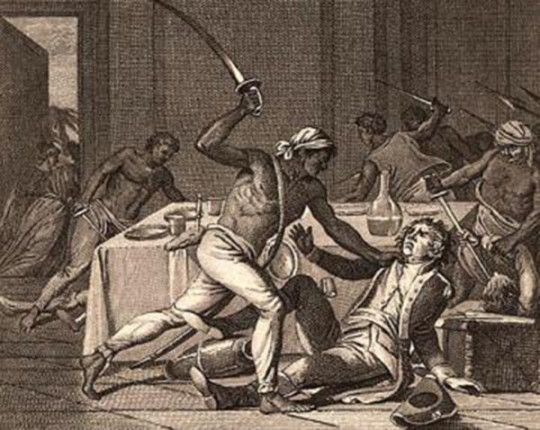
To be of Hoodoo is, and has always been, to fight back. Let this be a reminder, forever to be drilled into our psyches: We been fighting. We been sacrificing. We been spiriting. We been victorious.
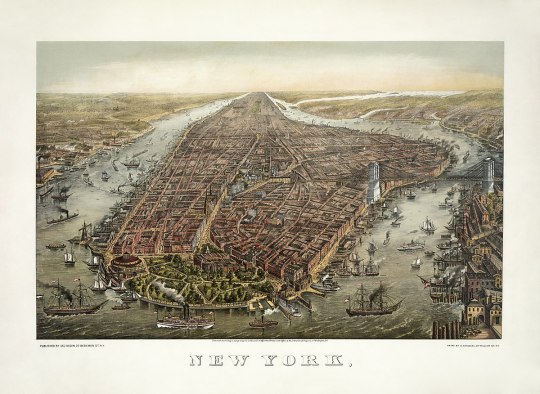
Today, 83 Maiden Lane sits in the infamous Financial District of Manhattan & now serves as the headquarters of the AHRC (Association of Help for Retarded Children). But beneath the cloak of modern amenities & reconstructive efforts, the once-scorched Earth still remembers the night of April 6th. This is where we made our stand. This, & the streets along the northern edge of Manhattan, is a place of power.
It is important to remember the when & WHERE of this event (and those that followed) as many to this day falsely believe that the North was somehow the righteous exception to the Eurocentric cruelties of Maafa. The North was not the exception then & is not the exception now. May we:
• Meditate on the cost of true freedom that these Ancestors paid in blood so we wouldn't have to.
• Pour libations for them, especially those of us residing on or near the Financial District, as this is where our Ancestors were bought & sold from the docks on the East River to Wall Street.
• Remember our plight & presence in the Northern states that have lightened their reputation with the mask of progressive thinking.
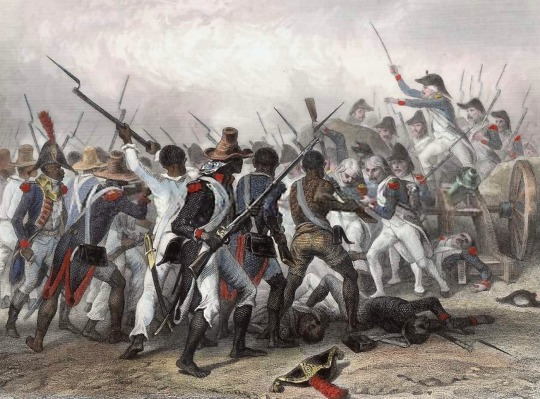
#slave rebellions#hoodoo#hoodoos#atr#atrs#the hoodoo calendar#juju#1712#the nyc revolt#the nyc revolt of 1712#nyc revolt of 1712#maafa#libations#ancestor veneration#black history#American history
176 notes
·
View notes
Text

Even the wheelers and dealers on Wall Street have a Christmas tree. Here it is on December 26, 1925, with the 116th Infantry Band playing Christmas airs and carols.
Photo: George Rinhart via Corbis/Getty Images
#vintage New York#1920s#George Rinhart#Wall St.#Wall St. Christmas#Christmas tree#Dec. 26#26 Dec.#NY financial district#vintage Wall St.#vintage NYC
155 notes
·
View notes
Photo

Light Show
#street photography#ny#new york#brookfield place#street#manhattan#financial district#nyc#november#my work#photography
33 notes
·
View notes
Text
Edward Helmore at The Guardian:
Former Republican congressman George Santos pleaded guilty to committing wire fraud and aggravated identity theft in a federal fraud case marking yet another low point for a politician famed for the outlandish lies and fantasies he peddled during his short but high profile political career. “I understand that my actions have betrayed my supporters and constituents,” Santos said in an emotional statement during the hearing. “I am committed to making amends and learning from this experience.” The disgraced ex-congressman faces a two-year mandatory minimum sentence under federal guidelines, but in court US district judge Joanna Seybert estimated a possible sentencing range between six and eight years when he returns to court again on 7 February. Santos, 36, had previously pleaded not guilty to a range of alleged financial crimes, including lying to Congress about his wealth, collecting unemployment benefits while actually working and using campaign contributions to pay for personal expenses.
The New York Republican entered the plea in a courtroom in Long Island just weeks before his trial was set to begin in early September. The prospect of a plea deal was raised late last week when a surprise court hearing was requested by prosecutors and Santos’s lawyers. Prior to the deal, two Santos campaign aides had already pleaded guilty to related crimes. Santos was once touted as a rising political star after he flipped the suburban Long Island district in New York state. But his story rapidly unspooled in the glare of public life as reports emerged he had lied about having a career at top Wall Street firms and a college degree along with other questions of his biography. Even in the Republican party of Donald Trump, where scandals over truth-telling have become an almost daily event, Santos managed to draw enormously negative attention. Members of his own party turned upon him, demanding he resign. New scandals then emerged about his campaign funds. Santos was first indicted on federal charges in May 2023, but refused to resign from office. Santos was expelled from Congress after an ethics investigation found “overwhelming evidence” that he had broken the law and exploited his public position for his profit.
Former Rep George Santos (R-NY) pleads guilty to federal counts for wire fraud and aggravated identity theft.
9 notes
·
View notes
Text
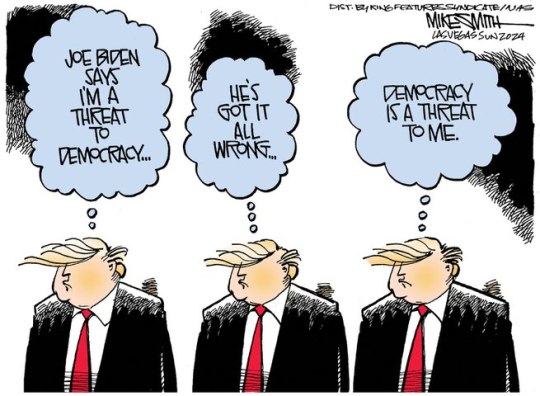
Mike Smith :: Las Vegas Sun
* * * *
LETTERS FROM AN AMERICAN
April 29, 2024
HEATHER COX RICHARDSON
APR 30, 2024
In December 2020, when the pandemic illustrated the extraordinary disadvantage created by the inability of those in low-income households to communicate online with schools and medical professionals, then-president Trump signed into law an emergency program to provide funding to make internet access affordable. In 2021, Congress turned that idea into the Affordable Connectivity Program (ACP) and made it part of the bipartisan Infrastructure Investment and Jobs Act (also known as the Bipartisan Infrastructure Law).
The program has enabled 23 million American households to afford high-speed internet. Those benefiting from it are primarily military families, older Americans, and Black, Latino, and Indigenous households. In February, the Brookings Institution cited economics studies that said each dollar invested in the ACP increases the nation’s gross domestic product by $3.89 and that the program has led to increased employment and higher wages. It also cuts the costs of healthcare by replacing some in-person emergency room visits with telehealth.
Slightly more of the money in the program goes to districts represented by Republicans than to those represented by Democrats, which might explain why 79% of voters want to continue the program: 96% of Democrats, 78% of Independents, and 62% of Republicans.
But the ACP is running out of money. Back in October 2023, President Joe Biden asked Congress to fund it until the end of 2024, and a bipartisan bill that would extend the program has been introduced in both chambers of Congress. Each remains in an appropriation committee. As of today, the House bill has 228 co-sponsors, the Senate bill has 5.
Senate majority leader Chuck Schumer (D-NY) has said he supports the measure, but House speaker Mike Johnson (R-LA) has not commented. Judd Legum pointed out in Popular Information today that the 2025 budget of the far-right Republican Study Committee (RSC) calls for allowing the ACP to expire, saying the RSC “stands against corporate welfare and government handouts that disincentivize prosperity.” More than four fifths of House Republicans belong to the RSC.
The differences between the parties’ apparent positions on the ACP illustrates the difference in their political ideology. Republicans object to government investment in society and believe market forces should be left to operate without interference in order to promote prosperity. Democrats believe that economic prosperity comes from the hard work of ordinary people and that government investment in society clears the way for those people to succeed.
Wealth growth for young Americans was stagnant for decades before the pandemic, but it has suddenly experienced a historic rise. In Axios, Emily Peck reported that household wealth for Americans under 40 has risen an astonishing 49% from where it was before the pandemic. Wealth doubled for those born between 1981 and 1996. This increase in household wealth comes in part from rising home prices and more financial assets, as well as less debt, which fell by $5,000 per household. Households of those under 35 have shown a 140% increase in median wealth in the same time period.
Brendan Duke and Christian E. Weller, the authors of the Center for American Progress study from which Peck’s information came, say this wealth growth is not tied to a few super-high earners, but rather reflects broad based improvement. “A simple reason for the strong wealth growth is that younger Americans are experiencing an especially low unemployment rate and especially strong wage growth,” Duke and Weller note, “making it easier for them to accumulate wealth.”
In honor of National Small Business Week, Vice President Kamala Harris today launched an “economic opportunity tour” in Atlanta, where she highlighted the federal government’s $158 million investment in “The Stitch,” a project to reconnect midtown to downtown Atlanta. This project is an initial attempt to reconnect the communities that were severed by the construction of highways, often cutting minority or poor neighborhoods off from jobs and driving away businesses while saddling the neighborhoods with pollution.
While some advocates wanted to use the $3.3 billion available from the Bipartisan Infrastructure Law and the Inflation Reduction Act to take down highways altogether, the administration has shied away from such a dramatic revision and has instead focused on creating new public green spaces, bike paths, access to public transportation, safety features, and so on, to link and improve neighborhoods. More than 40 states so far have received funding under this program.
The administration says that projects like The Stitch will promote economic growth in neighborhoods that have borne the burden of past infrastructure projects. Today it touted the extraordinary growth of small businesses since Biden and Harris took office, noting that their economic agenda “has driven the first, second and third strongest years of new business application rates on record—and is on pace for the fourth—with Americans filing a record 17.2 million new business applications.”
Small businesses owned by historically underserved populations “are growing at near-historic rates, with Black business ownership growing at the fastest pace in 30 years and Latino business ownership growing at the fastest pace in more than a decade,” the White House said. The administration has invested in small businesses, working to level the playing field between them and their larger counterparts by making capital and information available, while working to reform the tax code so that corporations pay as much in taxes as small businesses do.
“Small businesses are the engines of the economy,” the White House said today. “As President Biden says, every time someone starts a new small business, it’s an act of hope and confidence in our economy.”
In place of economic growth, Republicans have focused on whipping up supporters by insisting that Democrats are corrupt and are cheating to take over the government. Matt Gertz of Media Matters noted in February that “Fox News host Sean Hannity and his House Republican allies spent 2023 trying to manufacture an impeachable offense against President Joe Biden out of their fact-free obsession with the president’s son, Hunter.” At least 325 segments about Hunter Biden appeared on Hannity’s show in 2023; 220 had at least one false or misleading claim. The most frequent purveyor of that disinformation was Representative James Comer (R-KY), chair of the House Oversight Committee, who went onto the show 43 times to talk about the president’s son.
The House impeachment inquiry was really designed to salt right-wing media channels with lies about the president and, in the end, turned up nothing other than witnesses who said President Biden was not involved in his son’s businesses. Then the Republicans’ key witness, Alexander Smirnov, was indicted for lying about the Bidens, and then he turned out to be in contact with Russian spies.
Comer has been quietly backing away from impeaching the president until today, when he popped back into the spotlight after news broke that Hunter Biden’s lawyer has threatened to sue the Fox News Channel (FNC) for “conspiracy and subsequent actions to defame Mr. Biden and paint him in a false light, the unlicensed commercial exploitation of his image, name, and likeness, and the unlawful publication of hacked intimate images of him.” His lawyer’s letter calls out FNC’s promotion of Smirnov’s false allegations.
Last year, FNC paid almost $800 million to settle defamation claims made by Dominion Voting Systems after FNC hosts pushed the lie that Dominion machines had changed the outcome of the 2020 presidential election.
Legal pressure on companies lying for profit has proved successful. Two weeks ago, the far-right media channel One America News Network (OAN) settled a defamation lawsuit with the voting technology company Smartmatic. Today, OAN retracted a false story about former Trump fixer Michael Cohen, apparently made to discredit the testimony of Stormy Daniels about her sexual encounters with Trump. OAN suggested that it was Cohen rather than Trump who had a relationship with Daniels, and that Cohen had extorted Trump over the story.
“OAN apologizes to Mr. Cohen for any harm the publication may have caused him,” the network wrote in a statement. “To be clear, no evidence suggests that Mr. Cohen and Ms. Daniels were having an affair and no evidence suggests that Mr. Cohen ‘cooked up’ the scheme to extort the Trump Organization before the 2016 election.”
LETTERS FROM AN AMERICAN
HEATHER COX RICHARDSON
#Mike Smith#Heather Cox Richardson#Letters From An American#defamation claims#Affordable Connectivity Program#income inequality#small businesses#economic growth#RSC Republican Study Committee#trickle down economics
13 notes
·
View notes
Text
new york itinerary: tourist spots
hey everyone 🎀 i just posted part one on my blog if you want to check those out too🫶🏽 i’m sooo excited for my new york tripin two weeks!! i may go to other “touristy” spots but i’m being intentional about making time to do other things as well!! so my next ny posts will skew away from touristy spots and will touch on restaurants, elite places, hidden spots…etc 💗
part two
🎀 go to the financial district and eat a hot dog (ny, ny)

🎀 go to the flower district and buy a pretty bouquet (location below)

“On West 28th Street between Sixth and Seventh Avenues, you can find the sweetest smelling, most lush neighborhood there is in NYC - the floral district. Although it’s not as popular as its adjacent neighborhoods, it’s a lively gem that floral designers and flower shop owners alike frequent regularly.”
🎀 places for next time
1. rockefeller center (ny, ny)

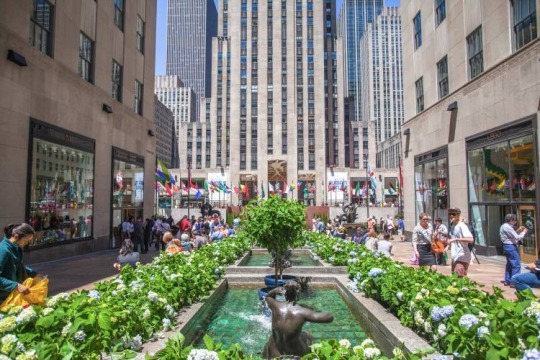
2. summit one vanderbilt (ny, ny)


visit my blog for my new york itinerary: tourist spots part 1 and more it girl vacation planning posts
#diary#black girl blogger#black hypergamy#black girl travel#travel#level up#leveling up#hypergamous lifestyle#hypergamous#hypergamy#black girl tumblr#soft black woman#soft black women#soft black girls#manifesting#master manifestor
21 notes
·
View notes
Text
How to Become a Mob Boss: Quote episode 1 to 4
"- Mob boss is basically the CEO of an organization. And some of these organizations are very big, and some of them make an awful lot of money." (George Anastasia - Organized Crime Writer - Episode 1)
"- You have to be smart and know how to motivate and, at times, frighten people to keep them in line." (George Anastasia - Episode 1)
"- To be a successful mob boss, first of all, you have to be driven." (Ellie Honig - Former Federal Prosecutor, Southern District of NY - Episode 1)
"- From Torrio, young Capone learned these rules. Dress for success. Keep your mouth shut. And when it comes to staying on top, remember, money is power." (Narrator - Episode 1)
"- Frankie Yale taught Capone an alternate set of skills. Always show you mean business. Never get outgunned. And make sure your reputation precedes you." (Narrator - Episode 1)
"- Start with this mantra any wise businessman must follow, never pay retail." (Narrator - Episode 2)
"- Frank wanted to try to figure out, "How do I cut out the middleman to maximize my profits?" And also reduce the opportunity for a law enforcement to penetrate his organization." (Episode 2)
"- Anytime your sales volume isn't up to your full market potential, whatever the reason, you've got a problem." (Episode 2)
"- The playbook solution to this common dilemma? Become the only game in town." (Narrator - Episode 2)
"- If you corner the market, you have control over the market. You can charge whatever the hell you want." (Emily Sweeney - Reporter, Boston Globe - Episode 2)
"- But how do you make sure customers come to you to get their fix? It starts with marketing. Like most organizations, you have a product, you give it a brand name. So you want people to look for your brand. You have to make sure your brand is good. But clever branding only goes so far. It's what's in the package that counts." (Narrator - Episode 2) "- Frank stamped his "Blue Magic," and it was the best drop you could buy. Frank made sure his production line was in the hands of a true expert. The manufacturing genius he called Red Top." (Episode 2)
"- But to truly corner the market, Frank needed something else. A solid retail strategy. Studying police behavior, Frank notices a key pattern. At 4:00 p.m. daily, cops on the early shift leave their posts. But the night shift doesn't take over until 5:00. Frank instructs his lieutenants to hit the streets hard during this golden hour. While Frank monitors his crew's customer service by cruising through Harlem undercover." (Narrator - Episode 2)
"- If anybody slips up, there's hell to pay. But when your product sells this well, sometimes all you have to do is sit back and enjoy. This is why the crime gods invented money laundering. Ready to turn dirty money into clean cash? While techniques vary, they mostly follow the same basic steps. Step one. Placement. Create a legitimate business with a bank account where you can park your illicit profits, like a car wash or a strip club. Step two. Layering. Use complex transactions to separate the money from its illegal source. For example, buy gold. Cash it in. Then send that money from one international bank account to another to make it even harder to trace. Or sink the proceeds into assets like luxury cars, jewelry, or real estate. Then sell them again. Bringing us to step three. Integration. Invest your freshly-laundered dough into the legitimate financial system to keep the taxman off your trail. Voilà! Your dirty drug money is now clean as a whistle." (Narrator - Episode 2)
"- Everything's money. This is America." (Episode 2)
"- But when your core product is high-grade heroin, the happy days probably won't last forever. If you want to build your business to last, you need a strategy that can adapt to all market conditions. Frank used a multipronged approach to address this problem. Starting with a PR campaign. He thought doing things for the community would be an effective way of protecting himself and his entreprise. Loaning money to people. Not worrying about if you got it paid back. Taking care of people. So he kept a community on his side. He also made sure to take care of an even more important demographic. Cops. Frank spent a lot of money paying off police. Having the police on the take means being able to walk down the street and not worry about being locked up. It means knowing that you're gonna have a supply of drugs coming in safely without being interdicted by the police. But as many mob bosses discover, acts of generosity can leave some men in blue wanting more. But the early '70s, Frank Lucas has moved his family to a quiet house in the suburbs. But when you inhabit the criminal life, business has a way of following you home. Today, Frank is met by a unwanted visitor, a corrupt NYPD detective he comes to call Babyface. He orders Frank to pay him 10'000 cash a month. Or he'll shut down Frank's operation for good. Frank doesn't see any real options. But then Harlem's top drug boss makes one last transaction. Frank joined America's team and made a business decision to cooperate to reduce that jail time. As a businessperson, looking out for himself, he made the right decision for himself. Even if it meant turning on his own brother. That type of betrayal is it's hard to deal with sometimes. What can I say? It's just business." (Narrator - Episode 2)
"- But when you're a mob boss looking to consolidate your power, you look at human emotions differently. Mob bosses rule by fear. It's the best weapon. Ant there's one tested method for putting this spine-tingling tool to work. To make people understand fear, you have to perform violence." (Narrator - Episode 3)
"- If you are able to say, "I can kill you, I can kill your wife, I can kill your daughter, don't fuck with me"... you become a very powerful person." (Episode 3)
"- Nobody demonstrated this lesson as effectively as Sicily's boss of bosses, Salvatore "Toto" Riina. But he was mainly known for this astonishing figure. He is thought to have authorized between 800 and 1'000 killings. Secrecy was one of his weapons, and it built up his mystique within the Mafia. This kind of ghost figure that could be anywhere and might be listening to you as you spoke. He didn't need a luxurious lifestyle. He didn't care about that stuff, but what he did care about was power. One of the things that Riina is supposed to have said is, "Comandare é meglio che fottere," which mean, if I can use plain English "Being boss is better than fucking." (Alexander Stille- Author, Excellent cadavers - Episode 3)
"- That's why as a mob boss, you'll sometimes have to kill more than the story." (Narrator - Episode 3)
"- By the early '80s, Riina was dead set on increasing his power within the Sicilian Mafia. But he faced a stubborn obstacle. Something called the Commission. The Mafia Commission, also called the Cupola, is a governing body of sorts of the Mafia. It was made up of the head boss of the different families. It was a way of collaborating to make sure that business stayed on track. Riina begins to sit in the Commission in about 1969 but begins to have ambitions of domination. Riina's modest goal, force the Commission to name him Capo dei Capi, the Boss of Bosses. But there was one small problem. That position didn't exist. He believed that he should have absolute power. He did not want to share. So Riina decided to turn the job he had into the job he wanted. The Beast's plan, destroy his top rivals' organizations from within. It starts by making secret side deals. In return, they do Riina's dirty work for him... taking out their bosses and filling the ranks with mafiosi loyal to Riina." (Narrator - Episode 3)
"- It's very important for a mob boss to be the guy holding the strings over lawmakers because it allows them to expand their control and their rule." (Narrator - Episode 3)
"- Killing Dalla Chiesa showed, "We can take out anyone, and we will kill you if you get into our business." (Narrator - Episode 3)
"- If you're gonna harm your enemies, make sure you do it complete, so they can never come after you." (Narrator - Episode 3)
"- There's a word for when you've got nothing left to lose, freedom." (Narrator - Episode 3)
"- The message is, "If you mess with us, we don't care how high we have to go, we don't care how protected you are, we will kill you." (Narrator - Episode 3)
"- Aniello Dellacroce, who was the underboss of the Gambino family, became a mentor for Gotti." (Michael Franzese - Former Capo, Colombo Crime Family - Episode 4)
"- This is not about diplomacy. This is about an iron fist." (Episode 4)
"- No matter what organization you're looking to lead, you have to respect its structure. That's especially true with the Italian Mafia, also known as Cosa Nostra. In Cosa Nostra, There's a pecking order. At the top, you have your boss. Under the boss, you have your underboss. Then you have your consigliere, which is basically the advisor or the counselor. Then you have your captains. That's sort of your mid-level managers. And then you have your soldiers. Those are the made guys. Beyond that, you have associated. They're not made members of the group, but they're people who work with and contribute to the mob. In the American Mafia, you can't kill a fully initiated or made guy in your family, without getting permission from your boss. You can't whack a made guy in another family without getting permission from your boss and the boss of the other family. And if you want to clip your own boss, good luck. You need approval from the Commission. Basically, the Mafia board of directors. The rules were clear." (Narrator - Episode 4)
"- John Gotti needed to make his case through the proper channels, but he decided otherwise. He said, "Do it. Fuck it." We knew we couldn't get permission from this thing. Bosses want to protect each other in the Commission, so we formed this alliance which we called The Fist. So, there was five of us, and there was nobody saying no. It was just a time and a place." (Episode 4)
"- Smart mobsters don't want attention on themselves from law enforcement, from the media, from the public. They know that what they're doing is illegal, and attention can only hurt their bottom-line goal, which is to make money." (Ellie - Episode 4)
"- If you're gonna be out there and be flashy, you're going to embarrass law enforcement. So now we're gonna double down." (Lou - Episode 4)
"- When somebody develops this hubris is they make mistakes. Because they are operating under this false belief that nothing can touch me." (Joni Johnson - Forensic Psychologist and Private Investigator - Episode 4)
"- John Gotti was an egotistical narcissist who appeared to revel in the attention that he was getting from the press and from the public. And the more he got, the more he wanted." (Ed - Episode 4)
"- He's called the Dapper Don. Whoever named him the Dapper Don should have came down and talked to him. The reporter. He would've paid that guy $ 100'000 for that label. He loved those labels. I mean, you couldn't make that stuff up." (Sammy - Episode 4)
"- He operated in front of the cameras. He made himself into a celebrity, into a "front page of the tabloid" figure." (Ellie - Episode 4)
"- The Commission hired Sicilian mobsters to have Gotti killed. They put a bomb in the wrong car. Were it not for a little operator error, Gotti's ego would have cost him his life." (Narrator - Episode 4)
"- To be in this life, you have to be willing to go to prison, because at some point, you're gonna get caught. So make sure your time in government custody is productive." (Narrator - Episode 4)
"- RICO is the worst law they ever put on the books. It's Racketeering Influenced and Corrupt Organizations Act, and it's an all-encompassing law. It's very hard to defend." (Narrator - Episode 4)
"- You'd have to be a complete imbecile to be talking about a boss behind his back. He's got the ultimate power over your life, whether you live or die." (Sammy - Episode 4)
"- You know, that's a treacherous life. Dissension is created, and mistrust is created when something like that happens. Now, your own men are questioning that and worried about themselves. You know? What, am I next? That's what happens when you take your eye off the ball. You get a crew full of killers doubting your leadership." (Narrator - Episode 4)
"- The code in the American Mafia is silence. Don't talk about a murder that's committed. Don't talk on your phones. Don't talk indoors. Don't talk in your car. Everything's about keeping your mouth shut. The Mafia calls this code Omerta." (Narrator - Episode 4)
"- When you take the oath of Omerta, you're taking an oath to never admit that the life ever exists and to never betray the life. That's the oath. For a mafioso to break Omerta is tantamount to betraying your family, everything you know, everything you love." (Micheal - Episode 4)
"- It brings more notoriety to him. It legitimizes him. And it's getting turned around on the government that John Gotti is an innocent guy what works for a plumbing company. And they don't like him because he's in the public's eye." (Narrator - Episode 4)
"- The government was jealous of him because he was winning." (Renee)
"- In the end, Gotti did achieve the attention he always wanted. I think John Gotti represented people's frustrations with the government. How the government's always nickel-and-diming you, and John Gotti's fighting the government." (Lou)
"- Basically, Gotti was an example of how not to be a mob boss." (Narrator - Episode 4)
"- If you want fame, go become a fucking actor, or whatever you want to be, but don't be a mob boss." (Sammy - Episode 4)
"- Nobody tackled this challenge as creatively as Boston's most legendary mob boss, Whitey Bulger, whose ruthless attention to detail charted his path to infamy and then pulled a disappearing act for the ages." (Narrator - Episode 4)
4 notes
·
View notes